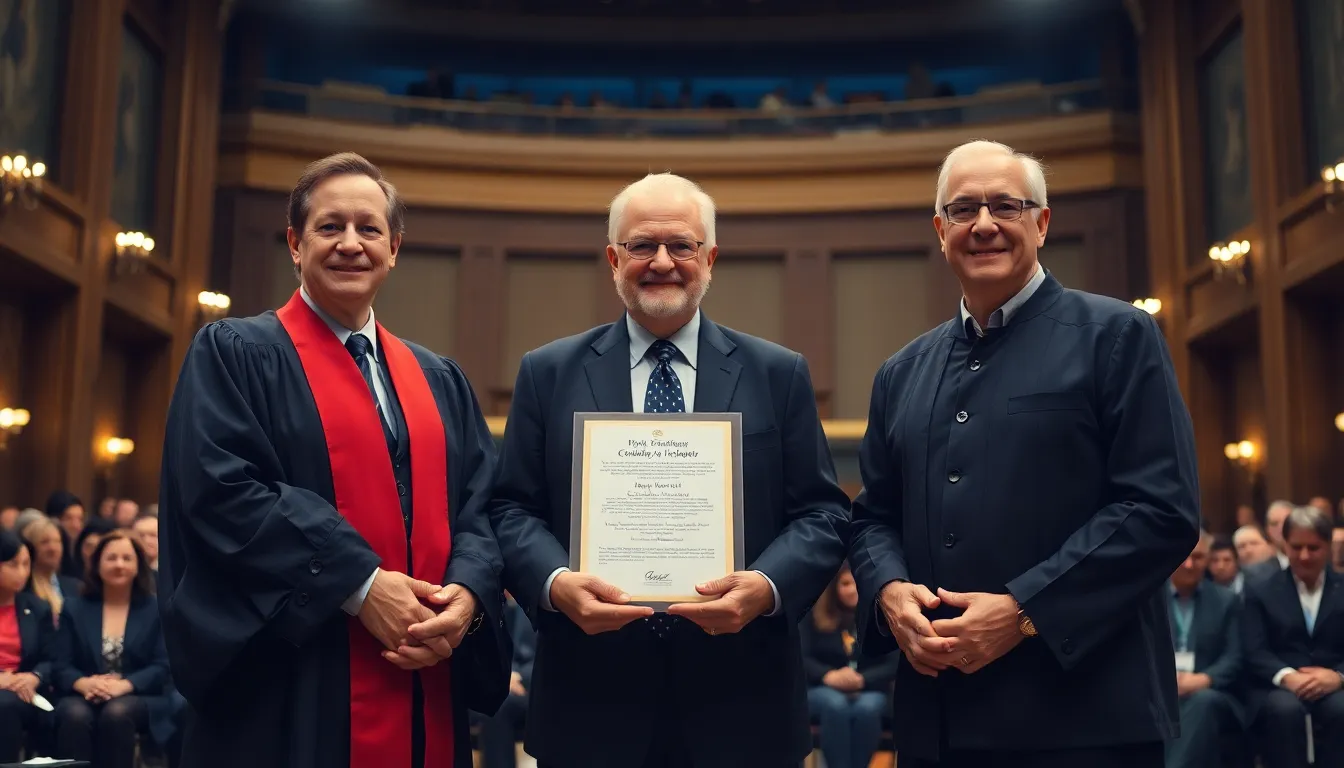Three esteemed faculty members from the Johns Hopkins Bloomberg School of Public Health have achieved a significant honor, as the “Three Bloomberg School Faculty Elected to National Academy of Medicine | Johns Hopkins Bloomberg School of Public Health” recognizes their induction into the NAM’s 2025 class. This elite membership, among the highest accolades in health and medicine, acknowledges their profound professional achievements and unwavering commitment to advancing global public health.
Key Implications
- Enhanced Institutional Influence: The election of three faculty members to the National Academy of Medicine significantly elevates the Johns Hopkins Bloomberg School of Public Health’s global profile and strengthens its authoritative voice in critical national and international health policy discussions.
- Direct Impact on Public Health Policy and Research: The expertise of the newly inducted faculty will directly contribute to formulating evidence-based policies, shaping future health research directions, and generating actionable recommendations for addressing complex global health challenges like disease prevention, health equity, and emergent threats.
- Pioneering Advances in Key Health Disciplines and Education: The honorees’ work brings pioneering advancements in global mental health, innovative biostatistical methods for public health policy, and the establishment of critical Indigenous Health academic programs, fostering new leadership and culturally informed solutions to persistent health disparities.

Three Faculty Inducted into National Academy of Medicine’s 2025 Class of 100 Members
A significant honor was bestowed upon three distinguished professors from the Johns Hopkins Bloomberg School of Public Health, who were elected to the National Academy of Medicine’s (NAM) 2025 class. This esteemed recognition acknowledges their profound professional achievements and unwavering commitment to advancing health and medicine. The announcement was made on October 20, 2025, during the NAM’s annual meeting held in Washington, D.C.
The National Academy of Medicine, established in 1970, stands as a pillar of excellence in the fields of health and medicine. It currently boasts a membership exceeding 2,000 highly accomplished individuals. Election to the NAM is among the highest accolades a professional in health and medicine can receive. It signals a career defined by groundbreaking contributions and dedicated service to global public health.
The Pinnacle of Professional Recognition
Membership in the National Academy of Medicine is not merely an honor; it is a testament to an individual’s significant professional achievements. It also highlights their dedicated service in health and medicine. These criteria ensure that only those who have truly pushed the boundaries of knowledge and practice are welcomed into this elite body. The rigorous selection process underscores the value of sustained excellence in research, clinical practice, and public health policy.
Since its inception in 1970, the collective work and recommendations of NAM members have profoundly influenced global health. Their insights have directly shaped research priorities, informed clinical practice guidelines, and guided public health policies worldwide. The expertise of these members contributes to solving some of humanity’s most pressing health challenges. This consistent impact reinforces the academy’s critical role in global health leadership.
The induction of three faculty members from the Johns Hopkins Bloomberg School of Public Health underscores the institution’s ongoing commitment to fostering leading experts. These individuals embody the school’s mission to protect health and save lives. Their election elevates the profile of the Bloomberg School. It also strengthens its voice in critical national and international health dialogues. This achievement reflects exceptional scholarship and leadership within the public health sector.
A Distinguished Class of 2025
The 2025 class of the National Academy of Medicine is notably robust, welcoming 100 new members into its ranks. This diverse group represents a wide array of disciplines and specialties within health and medicine. The inclusion of three professors from the Johns Hopkins Bloomberg School of Public Health highlights their outstanding contributions amidst a highly competitive global field. Their election signifies their standing as thought leaders.
Beyond the Bloomberg School, the broader Johns Hopkins University community also celebrated significant recognition. Two additional colleagues from the Johns Hopkins University School of Medicine were also elected to the NAM in 2025. This collective achievement underscores the pervasive culture of innovation and excellence across the entire Johns Hopkins institution. It demonstrates the university’s consistent impact on medical and health sciences.
The formal announcement of these elections during the annual meeting in Washington, D.C., served as a moment of collective recognition. It brought together existing members and newly elected individuals to celebrate their shared commitment. Such gatherings foster collaboration and discussion, further strengthening the NAM’s capacity to address complex health issues. The event marked a new chapter for these distinguished faculty members.
Impact on Public Health and Beyond
The expertise brought by the newly inducted Johns Hopkins Bloomberg School of Public Health faculty members will undoubtedly enrich the National Academy of Medicine’s ongoing work. Their specialized knowledge in public health will contribute to critical discussions on disease prevention, health equity, and global health challenges. These professors will join a network of peers dedicated to generating actionable recommendations for policymakers and practitioners.
Their involvement will help shape future directions in health research, ensuring that new discoveries translate into tangible improvements in public well-being. Furthermore, their perspectives will be vital in formulating evidence-based policies designed to address emergent health threats and disparities. The ongoing commitment from these individuals aligns perfectly with the NAM’s mission to inform and inspire action on critical issues.
This remarkable accomplishment for the Three Bloomberg School Faculty Elected to National Academy of Medicine | Johns Hopkins Bloomberg School of Public Health faculty reaffirms Johns Hopkins’s legacy as a trailblazer in health and medicine. Their leadership will undoubtedly inspire future generations of health professionals. It also reinforces the institution’s dedication to advancing health for all populations. The contributions from these new members will continue to resonate for years to come.
Their induction into the National Academy of Medicine represents a significant milestone in their careers. It also signifies a profound gain for the wider health community. The insights and guidance from these distinguished individuals will be instrumental in navigating the complex landscape of public health. They will continue to influence and improve health outcomes globally through their expert contributions.

Leading Research in Global Mental Health and Biostatistics Achieves Top 1% Citation Status
The election of faculty members to the National Academy of Medicine represents a pinnacle of recognition for outstanding contributions to health and medicine. Recently, the Johns Hopkins Bloomberg School of Public Health celebrated the induction of two prominent faculty members, Pamela Collins and Elizabeth A. Stuart. They were among three Bloomberg School Faculty elected to the National Academy of Medicine, recognized for significantly advancing their respective fields through high-impact research, prestigious awards, and consistent high citation rates. Their work exemplifies the rigorous pursuit of knowledge and its application to pressing global health challenges.
Advancing Global Mental Health Through Integrated Care
Dr. Pamela Collins, Chair of the Department of Mental Health at the Johns Hopkins Bloomberg School of Public Health, is a leading figure in global mental health. Her research primarily focuses on the critical intersections of global mental health, HIV care, and urban health. This integrated approach acknowledges that mental well-being is intrinsically linked with other health conditions and environmental factors, especially in vulnerable populations.
Dr. Collins has launched multiple influential research initiatives aimed at embedding mental health interventions into diverse care settings. These include essential areas such as HIV care, primary care, maternal health, and chronic disease care. Her strategic focus lies in low- and middle-income countries (LMICs), where resources are often scarce but the need for comprehensive mental health support is profound. Her work on integrating psychosocial interventions into routine HIV care and community-based care in sub-Saharan Africa demonstrates a practical and impactful strategy for improving health outcomes where they are most needed. These initiatives provide scalable models for sustainable health improvements across complex public health landscapes.
Pioneering Statistical Methods for Public Health Policies
Dr. Elizabeth A. Stuart, Chair in the Department of Biostatistics at the Johns Hopkins Bloomberg School of Public Health, is renowned for her development of innovative statistical methods. Her expertise is crucial for informing public health programs and policies, ensuring that interventions are evidence-based and effective. Her methodologies help researchers and policymakers understand complex data, leading to more targeted and impactful public health strategies.
Dr. Stuart’s exceptional influence in her field is underscored by her consistent recognition. She has been featured on the Clarivate Highly Cited Researchers lists since 2021, a distinction that places her among the top 1% of citations in her field globally. This sustained acknowledgment highlights the profound and lasting impact of her statistical innovations on public health research. Her work is not only theoretically sound but also widely applied and built upon by peers worldwide.
Further cementing her impact, Dr. Stuart was part of a team that received the prestigious 2025 Outstanding Statistical Application Award from the American Statistical Association. This award recognized their critical work in estimating the effects of abortion restrictions in the U.S. This research exemplifies how robust statistical methods can provide crucial insights into sensitive policy issues, informing public discourse and decision-making with rigorous data analysis.
Dr. Stuart’s current research projects continue to push the boundaries of public health methodology. She is actively involved in projects encompassing personalized public health, which utilizes multiple data sources to tailor interventions to individual needs. Furthermore, her work on enhancing the generalizability of randomized trial results is vital. This focus ensures that findings from controlled studies can be reliably applied to broader populations and real-world settings, thereby maximizing the reach and effectiveness of public health initiatives. Her dedication to advancing personalized public health and enhancing the generalizability of randomized trial results is fundamental for evidence-based practice.
These achievements highlight the deep impact of these researchers from the Johns Hopkins Bloomberg School of Public Health. Their combined efforts in global mental health and biostatistics contribute significantly to addressing some of the world’s most complex health challenges. The election of these three Bloomberg School Faculty to the National Academy of Medicine underscores the institution’s commitment to pioneering research that translates into tangible benefits for public health worldwide. Their leadership and dedication position them as leaders advancing health for all, inspiring future generations of public health professionals.

New Doctoral and Master’s Indigenous Health Programs Set for 2026–2027 Launch
Donald Warne is a distinguished faculty member. He works at the Johns Hopkins Bloomberg School of Public Health. Dr. Warne has spearheaded groundbreaking initiatives. These aim to advance Indigenous health equity. His visionary leadership culminates in the launch of new academic concentrations. These include a Doctor of Public Health (DrPH) in Indigenous Health. There is also a Master of Public Health (MPH) in Indigenous Health. These crucial programs are slated to commence soon. The launch is in the 2026–2027 academic year. This marks a significant milestone for public health education. It also benefits Indigenous communities.
The development of these specialized concentrations addresses a critical need. Indigenous health disparities have long persisted. They are often exacerbated by systemic issues. A lack of culturally informed interventions also contributes. Dr. Warne’s work at the Bloomberg School cultivates new leaders. These individuals will be equipped with essential knowledge. They will also have the sensitivity to tackle complex challenges.
Cultivating Expertise in Indigenous Health
The new DrPH and MPH Indigenous Health concentrations represent a pivotal step. They foster greater understanding and practical solutions. These programs are meticulously designed for students. They offer a deep dive into unique historical determinants. Social and environmental factors impacting health are also covered. Curriculum encompasses Indigenous epidemiology. It also covers traditional healing practices. Culturally appropriate policy development is another area. Community engagement strategies are crucial topics.
Future graduates will emerge as experts. They will develop and implement public health initiatives. These initiatives will be effective. They will also deeply respect Indigenous cultures and sovereignty. The launch in the 2026–2027 academic year underscores a clear commitment. The Johns Hopkins Bloomberg School of Public Health will build sustained capacity. This is within this vital field. It contributes to meaningful improvements in health equity.
These academic offerings will also serve as a hub. It is for collaborative research and innovation. The Bloomberg School aims to generate new knowledge. It also seeks best practices. This happens by attracting passionate students and faculty. This academic rigor combines with community-driven approaches. This ensures insights are directly applicable. They are beneficial to the populations they serve. This fosters impactful change.
Donald Warne: A Champion for Indigenous Health Equity
As co-director of the Johns Hopkins Center for Indigenous Health, Donald Warne is a leader. He is a physician and scholar. He dedicates himself to advancing Indigenous health. This includes education, policy, and equity. His profound expertise and unwavering commitment are evident. They have positioned him as a transformative figure. Dr. Warne’s leadership extends beyond academia. It includes direct policy influence and community engagement. He emphasizes a holistic approach to health and well-being.
His current research focuses on chronic disease prevention. This is a prevalent concern in many Indigenous communities. These studies prioritize the advancement of health equity. Methods are profoundly community-driven and culturally grounded. This approach recognizes sustainable health improvements. These improvements come from within communities. It leverages their inherent strengths and knowledge systems. Traditional practices are also important. This is rather than imposing external solutions. This commitment to self-determination in health defines his impactful work.
Beyond his academic and research roles, Dr. Warne serves. He is a senior policy advisor. This role is for the Great Plains Tribal Leaders Health Board. Here, he directly contributes to shaping health policies. These policies affect numerous tribal nations. This advisory capacity allows him to translate academic insights. He creates tangible policy recommendations. He advocates for equitable health resources and recognition. His work exemplifies how dedicated leaders can drive significant change. This is true in public health. It contributes to a broader movement of advancing health for all. This particularly benefits historically underserved populations.
Prior to his distinguished tenure. This was at the Johns Hopkins Bloomberg School of Public Health. Dr. Warne held several pivotal leadership roles. These included serving as the founding chair. He chaired Public Health departments. He also chaired Indigenous Health departments at other universities. Such experience has provided him with an unparalleled understanding. This applies to building robust academic programs. He also fostered innovative Indigenous health research and education. His extensive background ensures the new concentrations. They are built upon a foundation of proven leadership. They also have deep subject matter expertise.
The establishment of these new DrPH and MPH Indigenous Health concentrations is significant. It is under Dr. Warne’s expert guidance. It further solidifies the Johns Hopkins Bloomberg School of Public Health’s commitment. This commitment is to addressing global health disparities. It also fosters inclusive public health leadership. These programs will not only educate future generations. They will also empower Indigenous communities. They provide them with the tools and trained professionals. These are necessary to define their own health priorities effectively and sustainably.
Featured image generated using Flux AI
Johns Hopkins Bloomberg School of Public Health: “Three Bloomberg School Faculty Elected to National Academy of Medicine | Johns Hopkins Bloomberg School of Public Health”
